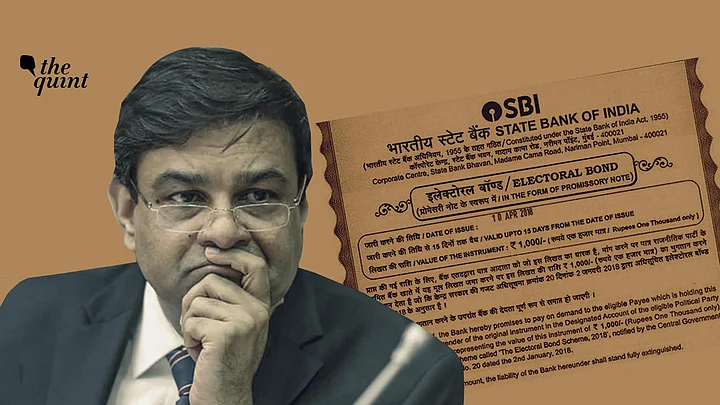“Issue of EBs (electoral bonds) in scrip (physical) form is fraught with serious risk of money laundering... If RBI agrees to issue EBs in scrip form, it will be accused of acquiescing in the process in spite of the risk that it would almost inevitably result in money laundering.”Urjit Patel in a letter to Arun Jaitley
Not just once but in much of the correspondence with then Finance Minister Arun Jaitley, then RBI Governor Urjit Patel insisted on issuing electoral bonds in a digital as opposed to a scrip form, citing threat of money laundering the latter would carry. However, the Finance Ministry overruled Patel’s concerns.
RTI documents on electoral bonds received by activist Anjali Bhardwaj and scrutinised by The Quint reveal that before electoral bonds were notified by the government, on 2 January 2018, Patel had, in September 2017, written two letters strongly objecting to issuing electoral bonds in “scrip form”.
14 September ‘17 Letter – ‘Digital Form Will Pave Way for Transparent Electoral Funding’
In his letter dated 14 September 2017, Patel opined that bonds in digital form would avoid their use for money laundering, prove cost-effective, and above all, pave the way for fully transparent electoral funding ie, records of donors of political funding, of which RBI would be custodian.
“We wish to stress that RBI has to be the exclusive authorised entity to issue EBs (electoral bonds) and we strongly believe that the digital form of EBs will mitigate risks and help to put the reform agenda of the government on a firm footing.”Urjit Patel in a letter to Arun Jaitley
Patel asserted that electoral bonds in digital form would be “more secure” and “reduce the printing cost”.
“The major objective of the electoral bonds scheme is to provide anonymity to persons making a contribution to political parties, we believe that this can be better achieved if electoral bonds are issued in electronic form with RBI as the depository.”Urjit Patel in a letter to Arun Jaitley
Government’s Response to RBI on 21 September ‘17
Finance Secretary Subhash Chandra Garg, in his letter dated 21 September 2017, expressed disagreement with Patel over issuing electoral bonds in electronic form.
“RBI’s suggestion on issuance of electoral bonds in electronic (demat) format only with the bond holders sharing unique identifier with the political party may take away a key feature of the Scheme to protect the identity of the donor from the political parties.”Finance Secretary Subhash Chandra Garg to Urjit Patel
Garg said the government considered the physical form to be the needed mode of issuance of electoral bonds.
27 September ‘17 Letter – ‘Risk of Money Laundering, Forgery’
Once again on 27 September 2017, Patel wrote to Jaitley and elucidated why electoral bonds shouldn’t be issued in scrip form since they would then be vulnerable to money laundering.
He further addressed the Finance Ministry’s concern over protecting donors’ identity, saying it could be addressed with electoral bonds in digital form as well, especially since RBI would be the sole custodian of donors’ and receivers’ information.
The question is – Why wasn’t the government confident in the RBI being the said information’s sole guardian? Why did the government, instead, make State Bank of India the authorised bank for issuing electoral bonds? As the SBI is already keeping record of purchase of electoral bonds through a hidden alphanumeric code, where is the anonymity?
Like Ministry of Law and Justice, RBI emphasised that electoral bonds in physical form may exchange hands several times before reaching the political party, which would “leave no trail of the transactions and in the process of providing anonymity to the contributor and to the political party, anonymity will be provided to several others in the chain of transfer of the electoral bonds. This can render the scheme open to abuse by unscrupulous elements”.
Patel posited “the possibility of black money being laundered. This could seriously undermine the credibility of the government on the important aspect of war on black money that has caught the imagination of the public at large... the electoral bonds in scrip form could also be exposed to the risk of forgery and cross-border counterfeiting”.
‘Let It Be’: RBI
Garg, in his letter dated 5 October 2017, reiterated the government’s stand, saying electoral bonds would be issued in scrip form.
Frustrated with the government’s response, RBI decided to not pursue the matter further. The file notings of an internal meeting on 18 October 2017 reveal the RBI had unanimously decided that “if the Government decides to issue electoral bonds in scrip form through SBI, the Bank should let it be”.
RBI Indirectly Agreed on Electoral Bonds: DEA
Taking RBI’s “let it be” as concurrence, Garg, in one of the file notings said, “RBI has indirectly agreed for electoral bonds to be issued by SBI… FM may like to approve the notification for issuance.”
The file noting gives the version of the then DEA Secretary, Subhash Chandra Garg. But there is no evidence of RBI having agreed to the objections.Jagdeep Chhokar, Member, ADR
Every institution which was involved in the electoral bonds scheme, from RBI to Election Commission to MoLJ, raised objections in the manner in which the government proposed to introduce the scheme.
The question is - why was protecting political donor’s identity so important that the government overlooked the danger of money laundering?
(At The Quint, we question everything. Play an active role in shaping our journalism by becoming a member today.)
